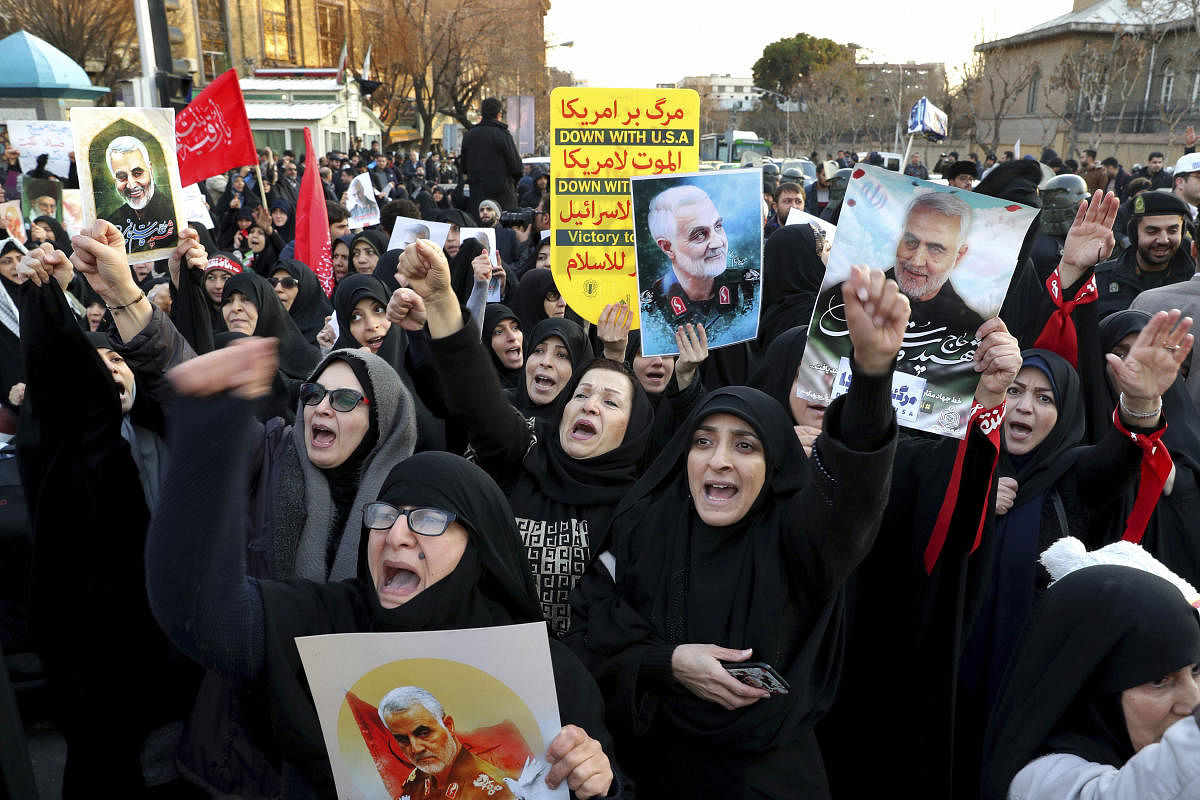
Iranian police and security forces fired both live ammunition and tear gas to disperse demonstrators protesting against the Islamic Republic's initial denial that it shot down a Ukrainian jetliner, online videos purported to show Monday.
There was no immediate report in Iranian state-run media on the incident near Azadi, or Freedom, Square in Tehran on Sunday night after a call went up for protests there. However, international rights groups already have called on Iran to allow people to protest peacefully as allowed by the country's constitution.
"After successive national traumas in a short time period, people should be allowed to safely grieve and demand accountability," said Hadi Ghaemi, the executive director of the New York-based Center for Human Rights in Iran.
"Iranians shouldn't have to risk their lives to exercise their constitutional right to peaceful assembly." Videos sent to the center and later verified by The Associated Press show a crowd of demonstrators fleeing as a tear gas canister landed among them.
People cough and sputter while trying to escape the fumes, with one woman calling out in Farsi: "They fired tear gas at people! Azadi Square. Death to the dictator!"
Another video shows a woman being carried away in the aftermath as a blood trail can be seen on the ground. Those around her cry out that she has been shot by live ammunition in the leg.
"Oh my God, she's bleeding nonstop!" one person shouts. Another shouts: "Bandage it!" Photos and video after the incident show pools of blood on the sidewalk.
Riot police in black uniforms and helmets gathered earlier Sunday in Vali-e Asr Square, at Tehran University and other landmarks. Revolutionary Guard members patrolled the city on motorbikes, and plainclothes security men were also out in force.
The crash of the Ukraine International Airline early on Wednesday killed all 176 people on board, mostly Iranians and Iranian-Canadians. After pointing to a technical failure and insisting for three days that the Iranian armed forces were not to blame, authorities on Saturday admitted accidentally shooting it down in the face of mounting evidence and accusations by Western leaders.
Iran downed the flight as it braced for possible American retaliation after firing ballistic missiles at two bases in Iraq housing US forces earlier on Wednesday. The missile attack, which caused no casualties, was a response to the killing of Gen. Qassem Soleimani, Iran's top general, in a US airstrike in Baghdad. But no retaliation came.
Iranians have expressed anger over the downing of the plane and the misleading explanations from senior officials in the wake of the tragedy. They are also mourning the dead, which included many young people who were studying abroad.
"Even talking about it makes my heart beat faster and makes me sad," said Zahra Razeghi, a Tehran resident not taking part in demonstrations who spoke earlier Sunday to the AP.
"I feel ashamed when I think about their families." "The denial and covering up the truth over the past three days greatly added to the suffering and pain of the families, and me," she added.
Another individual, who identified himself only as Saeed, said Iran's largely state-run media had concealed the cause of the crash for "political reasons." "Later developments changed the game, and they had to tell the truth," he said.
Some Iranian artists, including famed director Masoud Kimiai, withdrew from an upcoming international film festival. Two state TV hosts resigned in protest over the false reporting about the cause of the plane crash.
President Donald Trump, who has expressed support for past waves of anti-government demonstrations in Iran, addressed the country's leaders in a tweet, saying
"DO NOT KILL YOUR PROTESTERS." He later tweeted the same message again in Farsi.
"The World is watching. More importantly, the USA is watching," he tweeted.
Iranians demonstrated in November after the government hiked gas prices, holding large protests across the nation. The government shut down internet access for days, making it difficult to gauge the scale of the protests and the subsequent crackdown.
Amnesty International later said more than 300 people were killed.
A candlelight ceremony late Saturday in Tehran turned into a protest, with hundreds of people chanting against the country's leaders — including Supreme Leader Ayatollah Ali Khamenei — and police dispersing them with tear gas. Protests were also held in the city of Isfahan and elsewhere.
Police briefly detained the British ambassador to Iran, Rob Macaire, who said he went to the vigil without knowing it would turn into a protest.
"Can confirm I wasn't taking part in any demonstrations!" he tweeted. "Went to an event advertised as a vigil for victims of #PS752 tragedy. Normal to want to pay respects — some of victims were British. I left after 5 mins, when some started chanting." He said he was arrested 30 minutes after leaving the area.
Britain said its envoy was detained "without grounds or explanation" and in "flagrant violation of international law." Iran's Deputy Foreign Minister Abbas Araghchi later tweeted that Macaire was arrested "as an unknown foreigner in an illegal gathering."